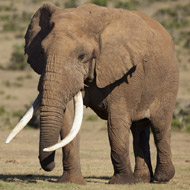
Study could inform human/elephant mitigation strategies
Asian elephants are able to recognise their bodies as obstacles to success in problem-solving, according to new research.
The study, published in the journal Scientific Reports, claims this ‘body awareness’ adds to increasing evidence of their intelligence.
“The more we can understand about elephants’ behaviour, the more we can understand what their needs are, how they think, and the strains they face in their social relationships,” explains study author Dr Josh Plotnik, a visiting researcher at the University of Cambridge.
“This will help us if we are going to try to come up with viable long-term solutions to the problems that these animals face in the wild, especially those that bring them into regular conflict with humans.”
In the study, researchers devised a new self-awareness test adapted from one used on children. In the children’s version, youngsters are asked to push a shopping trolley, but the trolley is attached to a mat on which they are standing.
In the elephant’s version, researchers attached a stick to a mat using a rope. The elephants were required to walk on the mat, pick up the stick and pass it to the experimenter in front of them. In a control portion of the test, the stick was unattached to the mat, meaning the elephant could still pass the stick whilst standing on it.
The aim of the experiment was to see whether elephants understood the role of their bodies as potential obstacles to success in the task. The researchers observed how and when the elephants removed themselves from the mat in order to exchange the stick.
The study found that elephants stepped off the mat to pass the stick to the experimenter significantly more during the test (42/48 times) than during the control (3/48 times).
Dr Plotnik argues that studies such as this are important to help increase our understanding of and appreciation for the behaviour and intelligence of animals.
He adds that understanding behaviour also has important implications for the development of human/elephant conflict mitigation strategies.



 The Veterinary Medicines Directorate (VMD) is inviting applications from veterinary students to attend a one-week extramural studies (EMS) placement in July 2026.
The Veterinary Medicines Directorate (VMD) is inviting applications from veterinary students to attend a one-week extramural studies (EMS) placement in July 2026.